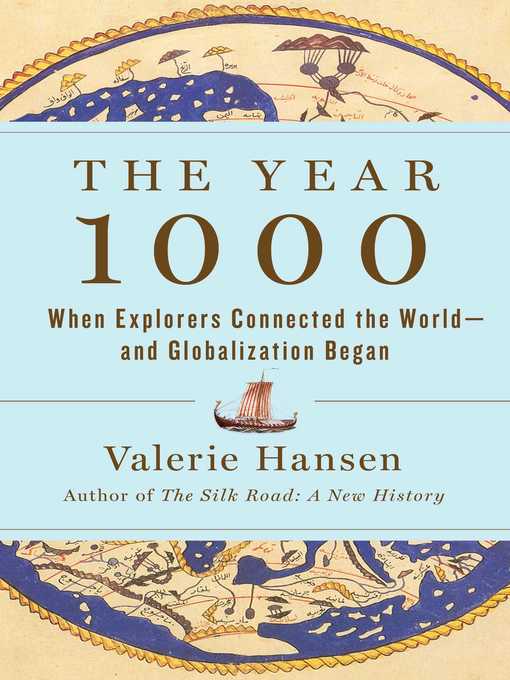
The Year 1000
When Explorers Connected the World—and Globalization Began
کتاب های مرتبط
- اطلاعات
- نقد و بررسی
- دیدگاه کاربران
نقد و بررسی

Starred review from February 3, 2020
The year 1000 CE marked the first chapter in the story of globalization, according to this vivid and edifying account by Yale University history professor Hansen (coauthor, Voyages in World History). Contending that trade networks established during this period set the stage for Europe’s age of exploration five centuries later, Hansen highlights Viking voyages to North America, goods and information that traveled 2,000 miles between the Mayan city of Chichén Itzá and Chaco Canyon in present-day New Mexico, and the slave and fur trades that linked the Byzantine Empire to Scandinavia. Hansen also documents the spread of Islam to Africa and central Asia, China’s thirst for Middle Eastern aromatics, and the arrival of Malaysian sailors in Madagascar. Noting that travelers who met each other in 1000 CE “were much closer technologically” than 16th-century Europeans were to the indigenous peoples of the New World, Hansen suggests that the period offers a key lesson for today: “Those who remained open to the unfamiliar did much better than those who rejected anything new.” She displays a remarkable lightness of touch while stuffing the book full of fascinating details, and easily toggles between the big picture and local affairs. This astonishingly comprehensive account casts world history in a brilliant new light.

February 1, 2020
If any reader still believes that the year 1000 marked the Dark Ages, this insightful history will set them right. Though Hansen (Chinese and World History/Yale Univ.; The Silk Road: A New History With Documents, 2016, etc.) pays some attention to the politics, religion, and culture of the era, she focuses on commerce, making a convincing case that this date "marked the start of globalization...when trade routes took shape all around the world that allowed goods, technologies, religions, and people to leave home and go somewhere new." For commerce to circle the globe, traders had to reach the New World, which happened around 1000, although no one knew it at the time. As befits that era's greatest explorers, Hansen begins with the Norse, who, after centuries of raiding around Europe and the Mediterranean, sailed to Iceland, then Greenland, then North America, where later chroniclers and recent archaeological evidence (plus the usual fakes) indicated their arrival around 1000 and some trading but no permanent settlement. Less known but far more significant, the Norse also battled their way east. Known by the locals as "Rus," by 1000, they had reached the Caspian Sea, adopted Christianity, and laid the foundation of Russia. Despite the nearly complete absence of writing, when Columbus reached America in 1492 and Islamic slave traders penetrated Africa well before 1000, they found complex cultures with well-established trade routes. Hansen then moves on to the flourishing, prosperous, technically advanced Middle East, India, and Southeast Asia, ending with superpower China, the center of a massive trading system stretching from the Indies to Arabia and Africa. The author covers a vast amount of territory in a concise, readable manner, making for a welcome contribution to the popular literature on early global trade and geopolitics.A thoroughly satisfying history of a distant era and people.
COPYRIGHT(2020) Kirkus Reviews, ALL RIGHTS RESERVED.

February 7, 2020
Hansen (Chinese history, Yale Univ.; The Silk Road: A New History) argues that globalization is not modern, but began around the year 1000 CE. She bases her thesis upon accepted evidence of Norse explorers reaching Canada and perhaps connecting with the pre-existing trade routes of Amerindians and evidence of South East Asians, Chinese, and Arabs expanding their networks into Africa, the Pacific Islands, and elsewhere. While intriguing, the argument proves insufficient: The presence of the Norse in North America and their potential trade--tenuous and brief--does not a global network make. Plus, trade routes in Afro-Eurasia were neither new nor unique. These networks and information exchanges have deep historical antecedents: Eric Cline's 1177 B.C.: The Year Civilization Collapsed details several examples existing two millennia prior. Yet, only the broad sweep fails. When the author focuses on specific developments, particularly in China, the work is engrossing and informative. VERDICT Readers of medieval history and anyone interested in the achievements of non-Europeans will enjoy this work. However, readers wanting to get a better understanding of globalism may be disappointed.--Evan M. Anderson, Kirkendall P.L., Ankeny, IA
Copyright 2020 Library Journal, LLC Used with permission.

March 15, 2020
The year 1000 marks a transformative time and the start of globalization, according to renowned historian, Hansen (The Silk Road, 2012) in this meticulous portrayal of the explorers, traders, and rulers who built a complex network which linked a disparate world. Hansen begins with the Vikings, and their voyages in search of a new world. She veers into the history of the Mayans, including the settlement of Chich�n Itz�, and their accomplishments in architecture and agriculture. Hansen traces the significance of Asian and Islamic empires and their trade in spices, knowledge, and precious metals. She acknowledges the origins of the human slave trade as territories amassed wealth and militias. While nautical prowess was a key, many empires acquired footholds through land invasion as in the case of the Mongols. Natural resources were not the only commodities to be traded, religion was also disseminated widely in the new areas during this time. Hansen's deeply engrossing work of scholarship builds a foundation for understanding our current iteration of globalization.(Reprinted with permission of Booklist, copyright 2020, American Library Association.)

























دیدگاه کاربران